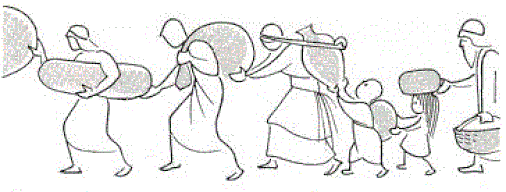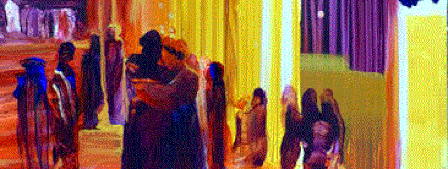
"If now I have found favor in your sight, put your hand under my thigh and promise to deal kindly and truly with me. Do not bury me in Egypt, (Gen 47:29 ESV)
You may have noticed that whereas I usually use the CJB for an English text of the Tanach, this time I used a ESV text. The reason for that is because whereas the CJB text represents a correct literate meaning, in this case, , the ESV gives us a more literal text which I need for this midrash.
The commentary Genesis Rabah 96:5 asks, "Is there such thing as "lovingkindness of lying", that Ya'akov should specify, "lovingkindness and truth"?!
Medieval Torah commentator Rashi notes that in Gen 47:29, Ya'akov asks for a favor to be done to him once he is deceased. Rashi then expounds on Ya'akov's request to Yoseph by observing that a favor done for the dead does not generate any reward from the deceased. The cannot say "thank you" or sit up to give you a smile of gratitude. Therefore "lovingkindness of lying" must be the type of lovingkindness that is done with the ulterior motive of a reward of some sort.
We have difficulties with the חן/kindness principle. Even if only in our subconscious, we look forward to rewards for our unselfish actions, even if it is just the warm feeling that comes from doing unselfish acts. Human nature is such that we need incentives. We have difficulty with the idea of giving without being rewarded with at least recognition or an acknowledgment of some sort. Our Master Yeshua who is aware of our natural selfish nature warned us against that attitude in,
What reward do you get if you love only those who love you? Why, even tax-collectors do that! And if you are friendly only to your friends, are you doing anything out of the ordinary? Even the Goyim do that! Therefore, be perfect, just as your Father in heaven is perfect.
(Mat 5:46-48 CJB)
Taking this further, here is a part of a teaching from Rabbi Chayim P. Scheinberg, head of Yeshiva Torah Or in Jerusalem. he says that, 'A woman should not look at her daily chores; she should be happy for the opportunity to take care of her home, especially caring for the children.'
Indeed when we feel like complaining about the dishes, let's remember that we have those dishes because HaShem in His great kindness provided us with something to eat. When we complain about house-cleaning we should think of those outside subject to the elements and who would be happy to have a home to clean. The sometime daunting task of raising children should always remind us that HaShem blessed us with them. Children rarely appreciate what their mothers do for them (until perhaps they have children of their own), so it is real "Chesed shel emet/kindness of truth" to care for young children. Sometimes spouses don't appreciate all the other does for them; therefore in order to work, marriage requires this sort of unrewarded kindness.
While we would easily accept the idea of serving unselfishly in the name of some cause or mission, we have a hard time accepting doing it for our own families. But what it the difference? When we serve people or a cause, there is the reward of recognition which sometimes families fail to give us. But in the eyes of the Father, the later is more meritorious than the former.
This principle can be applied to the one who stays home taking care of children, cooking,and cleaning the house, as well as to the one who goes out to "bring in the bacon" (turkey bacon of course :-)). Often that person has to be subjected to intense demands of jobs or assignments that they may or may not like; working with colleagues that they may or may not like; under a boss that they usually don't like and in less than perfect situations, But they are doing it for the chesed Torah obedience act of caring for their families, who may or may not show what they consider is the due appreciation for their efforts. Working under the negatives of these situation are the meritorious parts in eyes of HaShem.
I would like to take this further home and apply it to marriage.
Any given married person feels sometimes like they are doing all the giving while the other is only taking. Chances are that the other feels the same. That is because both look at things from the perspective of different lenses. More often than not, they are both right in their own merits so they refuse to see things from the other's point of view. At this point, it seems hopeless.
What we have to realize then is that according to the teachings of Torah and of our Master, while it is encouraged to be giving encouragement and praise to those who serve us, it is not wrong to do one-way giving without any expectations in return. It is actually meritorious to do that. Again, our Master said,
What credit is it to you if you love only those who love you?
Why, even sinners love those who love them.
What credit is it to you if you do good only to those who do good to you? Even sinners do that.
What credit is it to you if you lend only to those who you expect will pay you back? Even sinners lend to each other, expecting to be repaid in full.
(Luk 6:32-34 CJB)
Here is another article to illustrate the idea.
When Rabbi Moshe of Kobrin was 7 years old there was a severe famine in Lithuania. Poor people wandered from village to village in search of food. Many of them flocked to the home of Rav Moshe's mother, who readily cooked and baked for them. Once a very large number of the poor came to her home and she had to cook for them in shifts. When some individual grew impatient and insulted her, she began to cry, since she felt that she was doing her utmost for them. Her young son, the future Rabbi of Kobrin said to her, "Why should their insults trouble you? Don't their insults help you perform the mitzvah [commandment] with sincerity? If they had praised you, your merit would be less, since you might be doing the kindness to get their praise, rather than to fulfill the Almighty's command."
This anecdote goes against our natural reaction that would have the young rabbi protect his mother against the insults of the ungrateful beggar. Instead, the young Rabbi reminded her of the Torah which encourages us to forego earthly praise and acknowledgements for our good deeds in favor of heavenly praise and recognition. In this manner the young Rabbi protected more than his mother's present earthly temporary suffering; he secured and protected her future heavenly eternal reward!
This sounds much like what the writer in the Book of Hebrew wrote concerning the women of the persecuted Jewish messianic community in first century Israel, women who refused, ... to be ransomed, so that they would gain a better resurrection. (Heb 11:35)
This anecdote also illustrates the Master's teaching,
"Be careful not to parade your acts of tzedakah in front of people in order to be seen by them! If you do, you have no reward from your Father in heaven. So, when you do tzedakah, don't announce it with trumpets to win people's praise, like the hypocrites in the synagogues and on the streets. Yes! I tell you, they have their reward already! But you, when you do tzedakah, don't even let your left hand know what your right hand is doing. Then your tzedakah will be in secret; and your Father, who sees what you do in secret, will reward you.
(Mat 6:1-4 CJB)
I have heard of congregations closing down because of elder burn out. The work load always rested on the same people who eventually couldn't take it anymore. It is sad. As congregation members we should always seek what we can do for our congregation rather than what the congregation can do for us.
Whereas this situation is deplorable, congregation leaders should consider it an honor and privilege (not a chore) to serve those whom HaShem calls "His people", those whom Yeshua felt the need to serve to the point of giving His life though they were not at that time thankful for it. It is all a question of perspective: what is the reason for our service.
This reminds me of a story I heard. Two men were found on a synagogue building site. One complained as he went though the monotonous job of setting bricks in mortar to build a steady wall. Another man seemed to shine with glory as he accomplished the very same task. When asked the reason for his seeming joy, the replied, "I am building a house for the Torah; a place when HaShem's people will learn and maybe generate great teachers!" The two men were doing the same job, but perspective and vision made the difference as to how they saw their mission.
Our Master's acts of kindness were rewarded with man's ignominy and hatred. As such, Yeshua followed the sample of His Father who out of love for us gave His Son as a ransom for our Torah-breaking.
MAY WE LEARN TO DO WHAT IS RIGHT WHETHER WE ARE REWARDED OR NOT.
MAY WE LEARN IN EVERYTHING WE DO TO PERFORM FOR AN AUDIENCE OF 'ONE'; FOR HE WHO IS THE FATHER OF ALL KINDNESS AND TRUTH.
R' Gavriel Lumbroso

 RSS Feed
RSS Feed